Jonah just read this book entirely on his own!
Update: The online version of this book doesn’t even contain all the pages of the printed version that Jonah read. Notably missing is the “Sam sat on Mat” part of the story.
Americlecticintellectica
Jonah just read this book entirely on his own!
Update: The online version of this book doesn’t even contain all the pages of the printed version that Jonah read. Notably missing is the “Sam sat on Mat” part of the story.
Undoubtedly one of the best times to be in the health-club business is shortly after the new year, when everyone makes a new year’s resolution to lose weight and get fit, then joins a gym in order to accomplish those goals. As health clubs know, the majority of those new memberships will be of people who don’t actually show up more than a few times to use the facilities — and the gym gets to keep their non-refundable membership fees running to the hundreds of dollars each. My guess is that the income from January alone probably keeps a health club going at least until swimsuit season starts looming near.
On the one hand, it’s hard to fault health clubs for this practice. If you decide to join a gym, pay your money, then don’t show up, whose fault is it, theirs? No. On the other hand, there’s a P.T. Barnum sucker-born-every-minute aspect to this practice that is vaguely distasteful to plain-dealing folks like myself, who insist on receiving money only for actual goods or services delivered. So here is a common-sense consumer-protection suggestion from me to you:
If your new-year’s resolution is to get fit and lose weight (which I encourage), don’t join a gym first. Do ten push-ups, ten squats, and ten leg-lifts every day for fourteen days. (My doctor once told me, when encouraging an exercise regime I was beginning: “Fourteen days makes a habit.”) At the end of that time, if you are still consistently doing your exercises and your enthusiasm hasn’t waned, then join a gym.
(Disclaimer: get a doctor’s advice [I’m not one], do proper warm-up stretches, etc.)
If you do resolve to get fit and lose weight in the new year, and you were inclined to join a gym but you took my suggestion and you ended up abandoning your fitness regime, I will gladly accept a donation of 10% of the health club membership fee that I saved you!
Shortly after I wrote my eulogy for my childhood friend Jon, I sent a printed copy to his mother, who hadn’t heard from me, nor I her, since the 1970’s. After a few weeks she responded with a lengthy letter and a portfolio of Jon’s life: photos, writings, news clippings, accolades, stories about Jon, and finally many beautiful remembrances. I am happy to report that, short though Jon’s life was, it was rich and accomplished.
Jon was the editor-in-chief of his college humor newspaper. He earned a masters degree in sociology and a degree in law. As a legal intern he represented troubled youth in court, part of a child advocacy program. At the time of his death he was working to pass the bar exam, struggling with mounting medical problems arising from both his kidney disease and from a hepatitis infection he contracted from a transfusion years earlier. He was the first recipient, posthumously, of an award created in his honor, the Jonathan Roppolo Student Achievement Award of the Suffolk County Bar Pro Bono Foundation.
The other eulogies that Jon’s mom forwarded to me from friends and family were unanimous on many points: that Jon had exceptional intelligence, integrity, humor, and compassion; that he endured his disease and the tedious routines that went along with it entirely without complaint; that he had uncommon passion and drive; and that Jon made indelible changes for the better in those who knew him, as he did me.
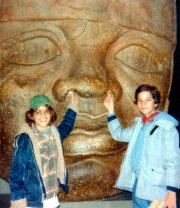 All of which makes him out to be rather a saint, which may indeed be appropriate but is also rather depersonalizing. When I knew him he was just an uncommonly fun friend, part of my inner circle. We hung out, played games, hatched schemes, acted silly.
All of which makes him out to be rather a saint, which may indeed be appropriate but is also rather depersonalizing. When I knew him he was just an uncommonly fun friend, part of my inner circle. We hung out, played games, hatched schemes, acted silly.
Does it take adversity of the kind that Jon faced his whole life to make someone passionate, driven, and accomplished? Maybe. I certainly don’t have Jon’s levels of passion, drive, and accomplishment, though I do have some of each. It is very possible that what I do have simply rubbed off of him somehow, long ago.
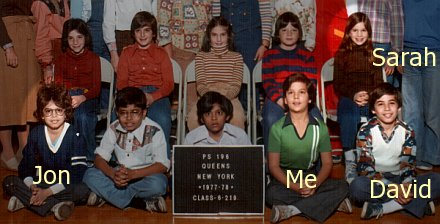
OK, got it.
Then the power went out. And Andrea went to work.
Yesterday was memorably windy here in the Bay Area and we were among the many affected by downed power lines. After scurrying around to perform clean shutdowns of our computers before the UPS’s gave out, we settled in to wait for the power to come back. Power failures are not all that uncommon in our area but they seldom last for more than a few minutes.
Minutes became an hour. The wind outside continued to howl, and our drafty house began to cool. The kids needed some breakfast and I was loath to open the refrigerator, lest our food begin to spoil if the outage was to be a protracted one. But I got the kids fed with a minimum of precious refrigerator-air lost. Then we sat down and began reading books together. I promised the kids a movie as soon as the electricity came back on.
An hour became two, then three. Alex needed a walk, and we had the opposite of the refrigerator problem: I didn’t want to let any of our warm air out. With some deftness I got her outside, then back in, about as quickly as could be managed with a frail, elderly dog.
By lunchtime the power was still out and I called out for pizza. We played with new Christmas toys and read more books. I taught the kids how to play “20 Questions.” Archer, only two and a half, was unclear on the concept: each time it was his turn to think of something he would begin by saying, “Is it an elephant?”
As the hours continued going by and the house continued to cool, I texted with Andrea on my Hiptop. Should we spend the night in a hotel (rather than keep Archer with his fever in a fifty-degree house overnight)? No: we found out that the estimated repair time for our power lines was 5-7pm.
Night came. We lit some candles and carried a flashlight. We hung out under the covers in “the big bed.” 7pm came and went with no electricity. We read more books. I recited the plots of some favorite movies. Andrea came home. The kids ate snacks, then fell asleep. We learned that the repair estimate was for 5-7pm the next day, but chose to stay the night anyway. It was warm enough under the covers, and the house — indeed the whole neighborhood — was delightfully silent. I snuggled under a fleecy blanket in the living room with volume three of The Baroque Cycle and my LightWedge.
At 10:30pm the electricity came back on. Although we had switched off all lights, etc., I knew immediately when power was restored: the total quiet was replaced by faint buzzing and humming coming from every direction as nominally “silent” electronics came to life all at once.
I modestly consider yesterday to have been a parenting triumph. Although Jonah complained, “It’s boring without TV,” in fact that was just a passing sentiment; he was never actually bored. We effortlessly filled an entire day with talking, reading, and interactive play, to say nothing of smiling and laughing, even in the absence of many of our usual comforts — evidence to me of a well-laid foundation for a healthy, fun family.
One afternoon this past summer I was in my office when the phone rang. It was Andrea. “There are bees in our house,” she told me.
“What?” I thoughtfully probed.
“There are thirty or forty honeybees flying around in the living room. Some of them are starting to die, they’re lying on the floor.”
“Did one of us leave a window open this morning?”
“Nope.”
“Then where did they come from?”
“I have no idea.”
 Thus began the Night of a Million Bees. Actually it was only thirty or forty, but to me it seemed like a million. You see, even though as a scientist I like and admire bees, and can even enjoy watching their industrious activities from a safe remove, in person I’m terrified of them. My parents used to make fun of the way I skedaddled out of the way whenever I saw one as a kid; they called it “The Glickstein Shuffle.” In summer camp I was always relegated to right field when we played softball, where the clover was dense and the honeybees were busy. Many were the times when a fly ball would land just a few steps from me while I was preoccupied with staying out of the bees’ way.
Thus began the Night of a Million Bees. Actually it was only thirty or forty, but to me it seemed like a million. You see, even though as a scientist I like and admire bees, and can even enjoy watching their industrious activities from a safe remove, in person I’m terrified of them. My parents used to make fun of the way I skedaddled out of the way whenever I saw one as a kid; they called it “The Glickstein Shuffle.” In summer camp I was always relegated to right field when we played softball, where the clover was dense and the honeybees were busy. Many were the times when a fly ball would land just a few steps from me while I was preoccupied with staying out of the bees’ way.
But now I am the head of a family and I have to be Brave, so I told Andrea to take Alex (our dog), pick up the kids at preschool, and keep them all at her office for the time being. I would go home, scope out the bee situation, and take appropriate action. I fully expected to take one quick look inside, see a buzzing swarm centered over our sofa, say, “Uh huh,” close the door again and get a hotel for a few days while armor-suited professionals tented our house and fumigated the hell out of it.
In fact what happened was this: I went into the house and immediately saw three or four bees on the floor in the entryway, motionless. I crept slowly inside, taking great care with each step, touching nothing and thoroughly scanning the next patch of floor before placing my foot on it. Sweating bullets, heart pounding, I switched on every light in the place until it was ablaze with brilliance, and then got a flashlight for good measure, and a long stick. I found more motionless bees: some in the kitchen sink; some on the sofa; some on the windowsill. I grew a bit bolder and pushed apart the slats of our vertical blinds with my long stick, and shone the flashlight in. There I found more bees. And more still between the sofa cushion, and under the piano bench, etc. Some were quite hard to see.
Then I noticed that a few were moving sluggishly; the first couple I’d seen, in the entryway, seemed to be coming quickly back to life! I trapped them under drinking glasses. Then, still trembling with fear, I plugged in the vacuum cleaner, assembled the long-reach hose, and began sucking up the bees. After ten heart-stopping minutes I believed I’d gotten them all, and only switched off the vacuum after considerable hesitation, certain that when the suction abated they’d emerge all abuzz to exact their revenge.
We slept at home that night, albeit a bit uneasily. But for several days there were no more bees. Then one day we saw three new bees in the living room, flying around, not yet exhausted. Emboldened by my prior experience, I sucked them up with the vacuum cleaner right out of midair. But the mystery of where they could be coming from remained.
One afternoon I heard a strange hum in the living room but saw no bees. I triangulated the sound to — our fireplace! That’s when I noticed that, though our fireplace doors have been closed for years — we never use it — a tiny air vent in the corner of those doors, big enough for a bee to crawl through, had been open all along. I closed it.
Our hypothesis now is that there is a nest of honeybees in our chimney, and perhaps a piece broke off and fell into our flue or even the fireplace. In the confusion some bees escaped through the air vent into our living room. We made a note to address the problem sooner or later, but it drifted down to the bottom of our priority list. After all, closing the vent seemed to solve the problem once and for all, why not let the bees be? We never use the chimney ourselves. We never even open the fireplace.
Except for tonight. Christmas Eve. How will Santa get in?
Tonight the kids will expect us to throw the fireplace doors wide and set out a folding table next to them with cookies and milk for Santa. But there is no way I’m opening those doors. What can we tell the kids to allay their fears that Santa will be locked out?
I may have to haul out the ladder, write a note, and let the kids see me taping it to the roof. “Dear Santa, there are bees in the chimney, please use the patio door.” Then of course we’d have to leave the patio door open, which exposes us to the possibility of a visit by one of the many neighborhood skunks. Bees, or skunks? Either way, Merry Christmas.
That’s it! I’ve had it with people who say that The Godfather Part II was as good as or better than the original.
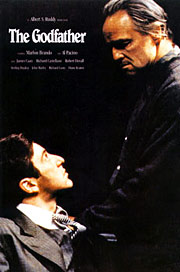 Let’s get this out of the way right now: The Godfather was a supernaturally good movie. The story, the characters, the performances, the settings, the cinematography, the editing, the music
Let’s get this out of the way right now: The Godfather was a supernaturally good movie. The story, the characters, the performances, the settings, the cinematography, the editing, the music
— everything came together perfectly, as if Francis Ford Coppola made a deal with the devil.
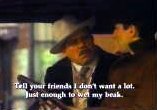 Part II? Lots of that was great, too. Numerous memorable moments. “I know it was you, Fredo. You broke my heart. You broke my heart!” De Niro as the young Vito — incredible. But does it add up to much more than the sum of its parts like the original? No. Most of its flaws are with the plot, which is at times confusing and inconsistent. For instance, I have never been able to find anyone able to answer these questions (warning: spoilers follow):
Part II? Lots of that was great, too. Numerous memorable moments. “I know it was you, Fredo. You broke my heart. You broke my heart!” De Niro as the young Vito — incredible. But does it add up to much more than the sum of its parts like the original? No. Most of its flaws are with the plot, which is at times confusing and inconsistent. For instance, I have never been able to find anyone able to answer these questions (warning: spoilers follow):
Continue reading “A movie you don’t like as much as you think you do”
When I learned many months ago that my beloved cousin Janet — who used to babysit me and my sister! — had become a medal-winning figure skater at age 50, I was astonished and proud (not to mention hopeful that I have the same “amazing gene” in my DNA somewhere). Now through the miracle of infotainment, everyone can be impressed by my cousin.
Yesterday I blogged about my 11th-grade math teacher, Mr. Arrigo, one of my greatest teachers ever. But any list of my greatest teachers must include Carl Sagan, even though he wasn’t “my” teacher any more than he was everyone else’s in the whole world.
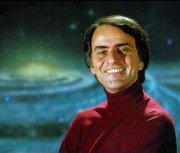 Sagan’s famous Tonight Show appearances happened right around the time I was old enough to stay up and see them. Early on I remember being annoyed by his criticisms of Star Wars (to wit: that spaceships don’t make whooshing noises in space, that Chewbacca deserved a medal at the end too, etc). But then my mom, who I think had a bit of a crush on him, urged me to read Broca’s Brain, and I was hooked on his brand of science education.
Sagan’s famous Tonight Show appearances happened right around the time I was old enough to stay up and see them. Early on I remember being annoyed by his criticisms of Star Wars (to wit: that spaceships don’t make whooshing noises in space, that Chewbacca deserved a medal at the end too, etc). But then my mom, who I think had a bit of a crush on him, urged me to read Broca’s Brain, and I was hooked on his brand of science education.
Then came Cosmos, which was eagerly anticipated in our household. We counted down to its premiere for weeks. When it finally aired, the cheesy new-age music and Sagan’s, er, limited acting abilities — the camera lingered forever on what was supposed to be his awestruck face as he sailed through the universe in his kinda lame “ship of the imagination” — left us at first unenthused. But then came his story of Eratosthenes and I got another one of those emotional learning moments that I wrote about yesterday. The following is from Cosmos, the companion book to the PBS series:
[Eratosthenes] was the director of the great library of Alexandria, where one day he read in a papyrus book that in the southern frontier outpost of Syene, near the first cataract of the Nile, at noon on June 21 vertical sticks cast no shadows. On the summer solstice, the longest day of the year, as the hours crept toward midday, the shadows of temple columns grew shorter. At noon, they were gone. A reflection of the Sun could be seen in the water at the bottom of a deep well. The Sun was directly overhead. […]
Eratosthenes asked himself how, at the same moment, a stick in Syene could cast no shadow and a stick in Alexandria, far to the north, could cast a pronounced shadow. […]
The only possible answer, he saw, was that the surface of the Earth is curved. Not only that: the greater the curvature, the greater the difference in shadow lengths. […] For the observed difference in the shadow lengths, the distance between Alexandria and Syene had to be about seven degrees along the circumference of the Earth [which] is something like one-fiftieth of three hundred and sixty degrees, the full circumference of the Earth. Eratosthenes knew that the distance between Alexandria and Syene was approximately 800 kilometers, because he hired a man to pace it out. Eight hundred kilometers times 50 is 40,000 kilometers: so that must be the circumference of the Earth.
This is the right answer. Eratosthenes’ only tools were sticks, eyes, feet, and brains, plus a taste for experiment. With them he deduced the circumference of the Earth with an error of only a few percent […] He was the first person accurately to measure the size of a planet.
In the TV show, when Sagan said matter-of-factly, “This is the right answer,” I got a lump in my throat. At once I was propelled farther down the paths of learning, teaching, science, and, of course, Carl Sagan fanhood.
It is more than just a shame that Sagan died before his time of a rare disease, ten years ago today. (This blog post is participating in a Carl Sagan “blog-a-thon” to commemorate the occasion.) There is no doubt that if he were alive today, he would never have permitted science to be debased by politics to the extent that it has in recent years. Sagan knew that we ignore science at our peril and excelled at conveying that message. He saved the world once before, by popularizing the nuclear winter theory of the aftermath of even small nuclear wars, assuring those insane enough to consider such wars that they could never avoid spelling their own doom as well as their enemy’s. Who will take up his mantle and bring the Promethean fire of science back to light a world darkened by his absence?